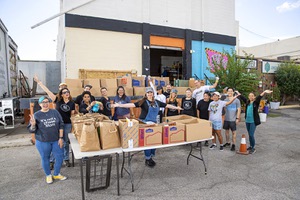Last March, philanthropy advisers the Moonridge Group teamed with major funding forces like the Elaine P. Wynn and Family Foundation, local restaurants like Honey Salt and nonprofits like the United Way to launch Delivering With Dignity—a direct response to Clark County Commission Chairwoman Marilyn Kirkpatrick’s concern that the spread of the coronavirus could cause some of Southern Nevada’s most vulnerable residents to slip through the cracks.
As a direct result, more than 275,000 healthy meals have been delivered to individuals and families in 67 ZIP codes, friends and neighbors identified by the program’s 47 nonprofit partners to be in need and at high risk during the pandemic.
Moonridge CEO and Principal Julie Murray, whose career achievements also include co-founding Three Square food bank and helping launch Andre Agassi’s charter school, says Delivering With Dignity was originally intended as a short-term initiative but it could continue through 2022. “We’ll keep it running for however long the need exists,” she says.
That’s just one of the ways Murray’s company has adjusted to COVID-19 conditions and continued connecting powerful community resources to provide strategic assistance. April saw the launch of Hope Means Nevada, a mental health initiative focused on suicide awareness.
We caught up with Murray to chat about the state of giving and philanthropy during one of the most challenging times in our community’s history.
You’ve been holding twice-annual Philanthropy Leaders Summits in Reno and Las Vegas. How did those unfold in 2020? We had our February event in person [Downtown], and we were scheduled to go in September to Reno. But instead we created a summit that was open to anyone to join virtually. We were a bit shocked because there were a lot of people sending out the announcement that [online educator] Sal Khan was speaking virtually from this summit in Nevada. It was so cool that we ended up breaking down the barriers of people having to fly in for it. We realized if they can join via Zoom, we can reach many more people than we have in the 10 years we’ve been having these events.
[This year,] we’re going to combine them and do one virtual summit in September that will be open throughout the country and work to have the keynote be someone of national interest, start at that high level and then move into specific discussions about Southern Nevada and Northern Nevada philanthropy.
What was the vibe during that virtual conference, given where we were in terms of the pandemic and understanding its effects on philanthropy? I believe it’s never been more important than it was when we had it in September, because people felt less connected due to COVID. It was also important to them to continue giving to their charitable causes and make the most impact they could make, even if they had a limited budget. We also learned from a midyear survey of different funders and foundations that they really loosened restrictions during this time. So for example, they might have been giving to a specific program or operation or initiative, but because of the relationship they have with the nonprofit, they left it to the discretion of the executive director to spend the gift where the need was the greatest. We also saw nonprofits collaborate more and funders collaborate more, knowing they needed to if they wanted to survive these very difficult times.
We know the philanthropic community in Southern Nevada is generous and very resourceful, but isn’t it also limited because Las Vegas is a relatively young city? Yes. The most recent survey from 2020 says the average American gave $608 per person last year, and here in Nevada it was $446 per person, which [ranked] us 43rd in the nation.
We really do feel like it’s a generous community, and since we’re a young community, that sort of multigenerational giving—where grandma and grandpa stepped in for the community so now I do the same—is not as prevalent here. There’s also such a large number of people who are new here, and they’re still thinking of their roots in Omaha or Austin and giving in the cities they [once] lived, because they haven’t felt like Las Vegas is home yet.
However, we’ve seen that starting to change more with the sports teams that have come here. It’s interesting that sports have done more to build a sense of community than other things that have occurred in Southern Nevada, and the teams brought the philanthropy with them. The Raiders gave $2.4 million in their first year in Las Vegas, and the Vegas Golden Knights [gave] around $2.7 million last year.
Pent-up demand is fueling an expectation that Las Vegas’ economy will recover from the pandemic quickly. Is there a similar expectation in the world of giving? I think so. Right when COVID was really growing and getting worse by the day, we started to poll funders in our state to see what they were looking at giving in 2020 and 2021, and 68% of individuals and family foundations were planning to keep their giving the same or increase it for 2020 and 2021. We would never have envisioned that many of them would increase their giving, and we were worried about corporate giving, because of the obvious cutbacks. But 50% of [corporations polled] said they’d keep it the same or increase.
Where we see the biggest setback is volunteerism. So many nonprofits really rely on volunteers, and for much of 2020, people just weren’t going out and giving their time. But we envision that coming back strong in 2021.
It seems like the pandemic has created more awareness about certain community needs. Are we seeing a new philanthropy, with regular people giving what they can to help? The most important thing for me to get across is that there’s never been a more important time for philanthropy. COVID-19 has impacted people in ways we probably won’t fully know about for years to come, until more results are known in areas like domestic violence and mental health. The government is going to be so challenged with its budget, so philanthropy is the thing we can do to help get our community turned around and back in the position of being a vibrant, healthy, inspirational place to live. It’s the difference between good and great.





